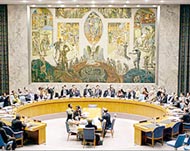Annan wants Iraqi oil-for-food probe
Secretary-General Kofi Annan has proposed an independent investigation of alleged corruption in the UN oil-for-food programme for Iraq.

The proposal came after allegations that UN staff might have reaped millions of dollars from the programme that helped Iraqis cope with international sanctions.
In a letter to the Security Council revealing his proposal, Annan said for the investigation to be “thorough and effective,” it would need the council’s support and the “active cooperation” of member states.
Annan said he would send another letter detailing how such an inquiry would be organised.
“I propose to establish an independent, high-level inquiry to investigate the allegations relating to the administration and management of the [oil-for-food] programme, including allegations of fraud and corruption,” he said in the letter released late on Friday.
No authority
Annan’s spokesman, Fred Eckhard, has said the secretary-general does not have the authority to investigate allegations in the media about wrongdoing by governments or companies.
He explained the oil-for-food programme “had no responsibility to oversee or investigate the kinds of contract skimming that have been reported in the media.”
He suggested the Security Council might want to look at the actions of companies or governments involved in the programme, or possibly ask the committee that monitored sanctions to look into the allegations, or have governments investigate their own national companies.
 |
|
The Security Council established |
Earlier on Friday, Annan told journalists he had been talking with Security Council members about the scope of the investigation.
“I think we need to have an independent investigation, an investigation that can be as broad as possible to look into all these allegations which have been made and get to the bottom of this because I don’t think we need to have our reputation impugned,” he said.
Resolution
Asked whether he needed a Security Council resolution to authorise such an investigation, Annan said: “Well, if not necessarily a resolution, an agreement, an understanding that they will cooperate and get others to cooperate to make the report … So their cooperation is going to be essential.”
The investigation will need “quite a bit of cooperation from others” because many companies and countries were involved in the oil-for-food programme, Annan said.
“But at least we will go ahead full speed under our own staff and hopefully it can be expanded to other areas,” the secretary-general said.
“The Iraqis themselves said they are organising an investigation and have documents which they said they have found which we are trying to get copies of.”
The United Nations has sent two letters to the Iraqi Governing Council and the US-led occupation administration requesting evidence of allegations of corruption in the programme – the latest a week ago – but so far no evidence has been received, Eckhard said on Thursday.
Gathering information
In late January, the Governing Council asked the country’s Oil Ministry to gather information on allegations that Saddam Hussein’s regime bribed prominent foreigners with oil money to back his government.
|
“I think we need to have an independent investigation, an investigation that can be as broad as possible to look into all these allegations and get to the bottom of this because I don’t think we need to have our reputation impugned” Kofi Annan, |
The request followed publication in the Iraqi newspaper al-Mada of a list of about 270 former cabinet officials, legislators, political activists and journalists from more than 46 countries suspected of profiting from Iraqi oil sales.
The list purportedly includes Benon Sevan, who headed the oil-for-food programme and vehemently denies receiving “oil or oil monies from the former Iraqi regime”.
“We certainly knew there was skimming by Saddam and his cronies but with regard to UN officials, no,” a US official told The Associated Press on Thursday, speaking on condition of anonymity.
“We certainly hope there are no UN officials involved, but if there are some, then they should be held accountable.”
Illegal revenues
US congressional investigators said on Thursday Saddam’s government reaped $10.1bn in illegal revenues related to the oil-for-food programme – much more than previous estimates.
The Security Council established the programme in December 1996 to help Iraqis cope with UN sanctions imposed after Iraq’s 1990 invasion of Kuwait.
The programme, which ended in November, allowed the country to sell unlimited quantities of oil, provided the money went primarily to buy humanitarian goods and pay reparations to victims of the 1991 Gulf war.